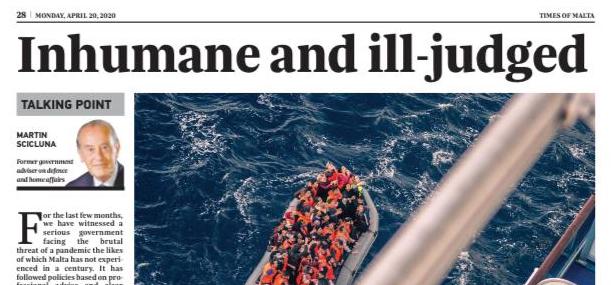The first reaction to an article like Martin Scicluna’s of this morning in Times of Malta is surprise. But it shouldn’t be. It really shouldn’t. He argues that lives at sea should be saved and that the government’s policy not to is “inhumane”, which indeed it is. This simple conclusion should be universal. What should be surprising is the fact that people can allow anything to come in the way of their own humanity and think otherwise.
Come l-Istrina, or a Dar tal-Providenza collection, or a president’s charity walk, we are reminded to leave behind our everyday political disagreements and come together to rest on what we all share in common, our intuitive senses of solidarity, generosity and mercy.
To imagine that for being a supporter of Joseph Muscat’s government, Martin Scicluna is incapable of this basic humanity may be excused by past experience but is, as can be seen today misguided and unfair.
I do make the mistake of conflating the outrage about someone’s opinion with which I disagree with the wrong idea that I belong to some minority with a monopoly on human values. Faced by the barbaric onslaught on Facebook that is going on right now and the repeated nuisance calls I get on my phone, I can plead in my defence that I am overwhelmed by the chorus of hate. But that’s no excuse to forget that even some of those sounding like rabid racists out there are wrong about themselves, misjudging themselves as deprived of human compassion.
I would bet that many of those writing ‘let the black fuckers drown’ on Facebook would give first aid to a black man run over by a car outside their doorstep. If we lose hope in the humanity of other fellow humans, we’ll be giving in to despair, we’ll give up, we’ll stop fighting.
We should focus less on who says what and more on what they’re saying. To be fair that point is a little self-serving. We’re attacked for speaking for migrants’ right to life because we – as individuals including myself – weren’t doing so 10 years ago. It would be a fair comment if we were to expect our arguments for other people’s right to life to prove what good people we are. But we aren’t. It is right that as individuals we regret not having taken up our causes earlier in our life. But that regret should not dilute the significance of our call for justice.
The argument applies to Martin Scicluna and many others who are stepping up in spite of any political sympathies they may have. By going into tirades about ‘where were you when …?’ we demean the ultimate truth of what he’s saying: all lives matter, they must all be saved.
We should all hope for national unity, but it must be a unity for good. I can never stand united behind a government policy that lets people drown, no matter how excellent that government’s results in other policy areas might be. But I do live in hope that more of us can come together on things we can all agree on. If a human is drowning, first save them, then ask for their passport.
